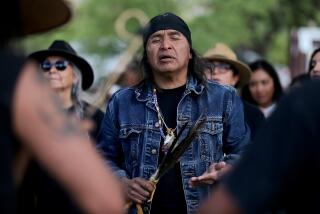Judge rules against ‘megaloads’ of tar sands equipment in Idaho
A federal judge has ruled that the massive hauls of equipment bound for the Canadian oil tar sands cannot use a narrow highway that runs through forested areas and Nez Perce tribal lands in Idaho.
Judge Lynn Winmill granted an injunction Thursday that halts the so-called megaloads — the most recent reportedly weighing 644,000 pounds and stretching more than 200 feet — until U.S. Forest Service officials finish a review of U.S. Highway 12 and consult with the Nez Perce, whose reservation is part of that area.
The tribe and activists who filed the lawsuit last month hailed Winmill’s ruling.
“This is a win for all who cherish the aesthetic, spiritual and recreational values of the Lochsa and Clearwater Rivers,” Kevin Lewis, conservation director for environmental group Idaho Rivers United, said in a statement. “The judge has provided the timeout needed to complete the environmental reviews, tribal consultation and rule-making necessary to protect this beautiful river corridor.”
The tribe and environmental groups described their lawsuit as their most recent effort to prevent the area, rich with wildlife, from becoming an industrial corridor. In addition to the environmental concerns, tribal leaders have expressed worries about public safety, with the slow-moving loads clogging the roadway.
The loads were transported by Oregon-based Omega Morgan, which was contracted by a General Electric subsidiary, RCCI, to carry water evaporators to tar sands in Alberta, Canada. Another load had been scheduled to travel through the area later this month.
In a statement Friday, RCCI said it was disappointed by the judge’s ruling. William Heins, the company’s chief operating officer, said, “We have addressed the safety, environmental and aesthetic considerations in choosing this route for shipment, and we have met the legal requirements by obtaining permits for previous shipments” from state officials.
Borg Hendrickson, an activist with a coalition called Rural People of Highway 12 Fighting Goliath, said the ruling came as a “great relief,” but she noted that the issue hadn’t been resolved.
“It’s absolutely a victory,” she said, “but the case goes on.”
More to Read
Start your day right
Sign up for Essential California for news, features and recommendations from the L.A. Times and beyond in your inbox six days a week.
You may occasionally receive promotional content from the Los Angeles Times.






